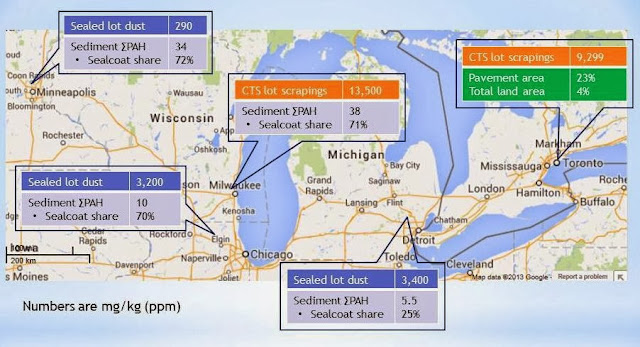The second in a series of EPA-funded webinars coordinated by the Minnesota Pollution Control Association is set for Wednesday, November 20, 2013 at 9:30 am CST. The focus of this session is the State/Provincial-level efforts.
As you can see from the agenda below it will include discussions from representatives from Minnesota, Wisconsin, and Michigan. While the Minnesota efforts are reasonably well known, the efforts to phase out the use of coal tar sealants in these other states and provinces are less well-known. Some may not realize that the nation’s second ban of coal tar sealers was in Dane County, Wisconsin. It was an important first acknowledgment that other water quality professionals came to the same conclusions as those of us in Austin.
We have covered the issues in Michigan and Wisconsin with the posts shown below and in the future will include reporting on activities in Indiana, Illinois, Ohio and the Canadian Province of Ontario.
Michigan
- Michigan School Wrestles with Coal Tar Sealants (January 2011)
- Another State with a Municipal Sealant Ban (see comments) (March 2011)
- University of Michigan Continues Its Pledge to Be Coal Tar Free (April 2012)
- Michigan Moves to Ban Coal Tar Sealers…Again (November 2012)
- Badger State Ban Breakers Face Bigger Bills (August 2011)
- Hoping Sealant Company’s Promise Sticks (March 2012)
- 40 Brave Sealant Applicators Take the Pledge to be Coal Tar Free (see comments) (January 2013)
- Is Coal Tar Trouble Brewing in Milwaukee? (February 2013)
Phasing Out Coal Tar Sealcoats Update
Minnesota Pollution Control Agency sent this bulletin at 11/14/2013 10:28 AM CST This is a reminder to register through http://www.pca.state.mn.us/h8udqd6 for this week’s webinar:
State/provincial-level programs – Wednesday, November 20th, from 9:30-10:30 Central time. In addition to providing more background on coal tar sealcoat use and efforts in 3 states to reduce associated PAH releases, we will describe studies done in the Great Lakes area and how they can help focus reduction programs.Thank you.Al Innes, MPCA
DRAFT Agenda
1. Intro (10:30 Eastern)
2 a. Overview of voluntary prevention approaches & tools (10:35)
b. Program components for state agenciesc. Locations of probable coal tar use – Al Innes, Minnesota Pollution Control Agency
3. University-based statewide outreach founded on health issues (10:50)- David Liebl, U of WI-Extension, Solid & Hazardous Waste Education Center
4. Early efforts in Michigan (11:05)- Chris Affeldt, MI Department of Environmental Quality
5. Summary of progress and lessons learned (11:15)– Al Innes, MPCA
6. Questions and answers (11:20)
End of formal program (11:30) – presenters will be available for further Q&A until 12:00 Eastern

